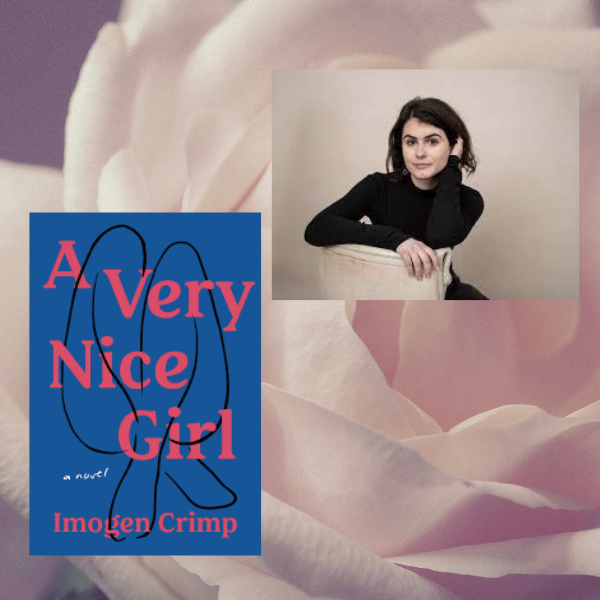A Very Nice Girl, the debut novel by Imogen Crimp, is a steeping tea of a novel. The novel builds with intrigue, humor, and discovery.
In A Very Nice Girl, Anna is a 24-year-old student at a music conservatory in London. Living in a cramped and personally uncomfortable space and embarking on a relationship with an older man, Anna learns the desires of her heart at an age that does not always afford the opportunity.
I interviewed Imogen about A Very Nice Girl including her structural decisions, the impact of Anna’s decisions, and exploring relationships.
Ashley Paul (AP): What is your definition of feminism?
Imogen Crimp (IC): Fundamentally, feminism is the principle that women are equal to men, and that women should be free to make choices about their bodies and their lives. It’s the movement to end oppression and discrimination on the basis of gender, and it is intersectional, taking into account our differences as well as our similarities. On an individual level, I think that feminism demands us to be honest with ourselves; it asks us to interrogate our choices and examine our unconscious beliefs, rather than taking the easiest path.
AP: You didn’t use quotation marks in A Very Nice Girl. How did you decide to structure the novel?
IC: I chose not to use speech marks because I was writing in the first person, following my protagonist’s perspective very closely. I wanted the style of the novel to feel true to how Anna, a 24-year-old woman, would actually talk; omitting speech marks, I found, contributed to the feeling of informality that I was trying to create. It also gave me the flexibility to make the feel of the prose looser at times, particularly moments of heightened emotion – to slide fluidly between speech and thought in Anna’s inner monologue, while retaining the feeling that we’re in her head.
AP: Anna makes decisions that ultimately inform the trajectory of her life. What was your intention in how Anna made her decisions?
IC: Anna is young, insecure, and quite isolated in London, where she’s recently moved to study opera at a conservatoire. She’s ambitious and driven to succeed in her singing career, but lost in her personal life – struggling to fit in with her more worldly singing peers, overshadowed by her confident best friend, Laurie, and, before long, swept into a tumultuous relationship with Max, an enigmatic older man. So Anna has contradictory motivations, which complicate her decision-making process. On the one hand, she is desperate to make it as an opera singer, and knows that fulfilling this ambition will require her total devotion and focus. On the other hand, she wants emotional stability, financial security, and love, and she believes that Max can provide them. Ultimately, Anna wants a secure and happy life, but she’s not always clear on what that would look like – and an element of self-destructiveness definitely creeps into her choices when she begins to lose control. My main intention was to create a realistic character, and I hope that Anna’s confusion and impulsivity ring true as a depiction of a young woman finding her feet.
AP: There are characters that have a brief space in the story yet are impactful to Anna. How did you craft this for the story?
IC: Initially, Anna is highly influenced by other people, particularly Laurie; because she’s struggling to find her place in the world, she looks to other people to inform her actions and opinions. But as the story progress, she starts to spend more and more time alone with Max in his flat, neglecting other areas of her life. In this, I wanted to create a sense of the claustrophobia that can come with being obsessively involved with another person, and to explore how blind it can make us to reality. At this point, the other people in Anna’s life – her friends, her teachers at college, her family – have much less of an impact on her, as she starts to care solely about Max’s opinion. Laurie does continue trying to influence and warn Anna, and in doing so she gives us an alternative perspective on Anna’s behaviour, but her ability to actually change what Anna does is minimal.
AP: Anna and Max’s relationship is an intrigue of emotions. What did you want to explore about relationships, especially age?
IC: I was interested in exploring how we mould ourselves to fit the expectations or desires of another person, particularly when we’re young – and, conversely, how insecurity, inexperience and lack of self-knowledge can lead us to project our own desires right back. From the beginning of the novel, Anna tries to second-guess what sort of person Max wants her to be, and to perform that role to him, even if it doesn’t feel right or natural to her; and she also projects her own fantasies onto him, harbouring unrealistic expectations about the role he could play in her life. It’s a relationship that is imbalanced for a number of reasons – Max is older, wealthier, more self-assured, and significantly less invested – but I didn’t want the relationship to be a black and white story of male exploitation. I wanted to explore the complexities inherent in relationships with these sorts of power dynamics; I wanted their relationship, like her name, to read both ways.
AP: Do you have a song you love to sing?
IC: Like Anna, I also trained to be a singer at a conservatoire in London, but sadly I don’t sing very much at all anymore. While Anna in my book mostly loves singing opera, I was always drawn to Lieder, particularly those by Schumann and Schubert. They have brilliant, complex texts, by poets such as Goethe and Heine, and the music is so emotionally intense and rich. I still have a bash at singing them sometimes!
You can follow Imogen


